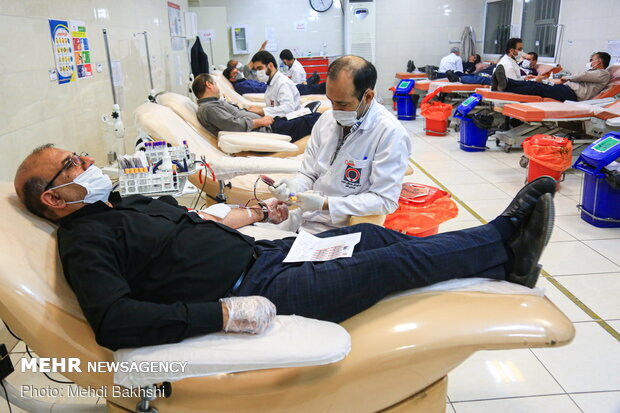Donating blood is an act of solidarity

TEHRAN - World Blood Donor Day takes place on 14 June each year. The day provides an opportunity to call to action governments and health authorities to provide adequate resources to increase the collection of blood from voluntary, unpaid blood donors and to manage access to blood and the transfusion of those who require it.
For 2022, the slogan is “Donating blood is an act of solidarity. Join the effort and save lives” to draw attention to the roles that voluntary blood donations play in saving lives and enhancing solidarity within communities.
To ensure that everyone who needs transfusion has access to safe blood, all countries need voluntary, unpaid blood donors who give blood regularly.
While blood donation in 70 countries still depends on replacement or paid donors, Iran is the first country in the region that has enjoyed voluntary blood donation by 100 percent since 2007.
In Iran, the safety and health of blood are guaranteed according to the latest global standards and are second to none in the Eastern Mediterranean region, says Abbas Sedaqat, a spokesman for the Blood Donation Organization.
The country is honored to be introduced as a colleague of the World Health Organization, aiming to promote and transfer the knowledge for donating and transfusing blood observing all the global standards.
There are currently 178 blood donation centers in the country and more than 2.1 million Iranians donate blood annually. Iran currently has the highest blood donation rate in the Eastern Mediterranean region.
While blood donation in 70 countries still depends on replacement or paid donors, Iran is the first country in the region that has enjoyed voluntary blood donation by 100 percent since 2007.
More than 85 percent of all donated blood worldwide is used to produce blood products, while the rate is 65 percent in Eastern Mediterranean countries. Iran ranks among the highest-income countries in terms of converting more than 97 percent of the blood donated by people to plasma-derived medicinal products (PDMP), according to WHO.
World Blood Donor Day
World Blood Donor Day was created to raise global awareness of the need for safe blood and blood products for transfusion; highlight the critical contribution voluntary, unpaid blood donors make to national health systems; and support national blood transfusion services, blood donor organizations, and other non-governmental organizations in strengthening and expanding their voluntary blood donor programs by reinforcing national and local campaigns.
The need for blood is universal, but access to blood for all those who need it is not. Blood shortages are particularly acute in low- and middle-income countries.
An effective blood donor program, characterized by the wide and active participation of the population, is crucial in meeting the need for blood transfusion during peacetime as well as during emergencies or disasters, when there is a surge in demand for blood, or when the normal operation of blood services is affected.
While an enabling social and cultural atmosphere with strong solidarity facilitates the development of an effective blood donor program, it is also widely acknowledged that the act of blood donation contributes to generating social ties and building a united community.
The specific objectives of this year’s campaign are to thank blood donors in the world and create wider public awareness of the need for regular, unpaid blood donation; highlight the need for committed, year-round blood donation, maintain adequate supplies and achieve universal and timely access to safe blood transfusion; recognize and promote the values of voluntary unpaid blood donation in enhancing community solidarity and social cohesion; raise awareness of the need for increased investment from governments to build a sustainable and resilient national blood system and increase collection from voluntary non-remunerated blood donors.

Leave a Comment